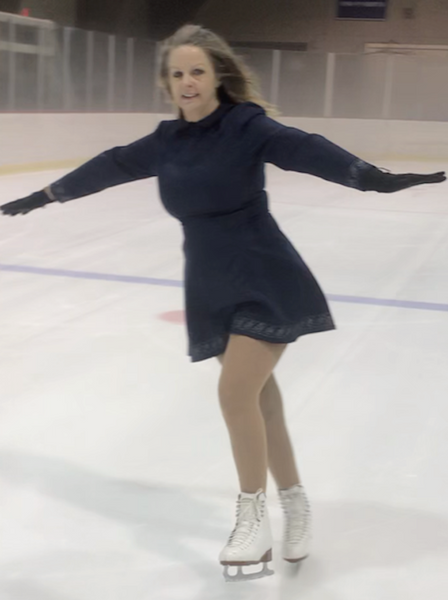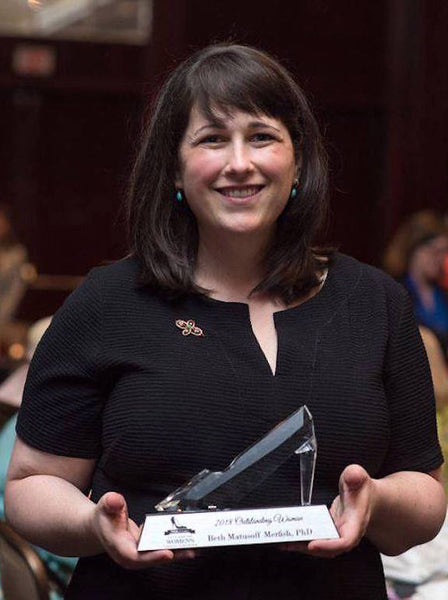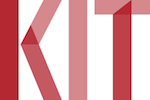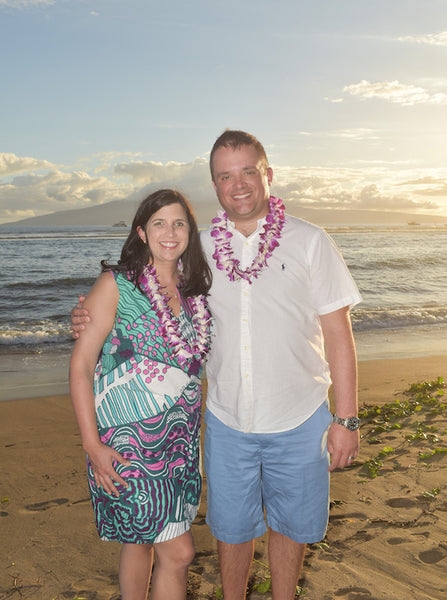Interview: Nadya Hajj

Tell us a bit about yourself: how would you describe yourself and your life in a quick snapshot?
I’m 35. I’m a wife, mama, runner, and professor of political science at Wellesley College. I live in a suburb of Boston. I am married to another professor, Patrick, and we have a daughter, Leila who is 3 years old. We live in a small house on a lake.
My work is very intense. I just published my first book, Protection Amid Chaos: The Creation of Property Rights (Columbia University Press, 2016). I travel to give book talks a few times every semester. Also, I’m up for tenure this year, so there is a lot of evaluation and it requires a lot of writing. I teach political science specifically the politics of the Middle East. Most of my research has focused on politics in refugee camps and how they create a system of order with no state. Since 2004, I’ve spent much of life living in refugee camps around the Middle East.
We have a good life, but a very busy life.
If you had to describe yourself using three adjectives, what would they be?
Disciplined, loyal, and sensitive, and maybe persistent to throw a fourth one in there.
When you were a child, what did you want to be when you grew up?
This is pretty funny. I wanted to be a 911 operator. I watched that show, Rescue 911, and I was fascinated. I would play this game that my stuffed animals had injuries, and I would make my two older brothers relay their injuries to me as the Rescue 911 operator. It is true still to this day, I’m good in disaster situations. I’m totally calm, and I can handle really bad things happening around me. I fall apart afterwards but I am good in the moment. I just felt like I would be good at helping people.
What was your very first job?
I was a baby-sitter.
My first consistent job was as a nanny for three kids the summer between high school and college. I was a nanny through college and even through graduate school when I was getting my PhD. I thought that meant I would be an awesome mom but I still don’t know what I’m doing.
What do you do to occupy your time: work, family, community?
For work, I teach two classes a semester and I’m on a lot of committees. One is dedicated to sustainability and one is the Wellesley Arab Women Association. It is both my work, but also the way I serve the community.
Outside of work, my husband and I love to run or be active together. When the weather is nice and my daughter has a sitter, we like to kayak on the lake behind our house. I have made a conscious effort to not work on the weekends. We go to the farmers market, spend time at parks, and try to keep our daughter occupied.
When not teaching in the summers, I dedicate myself to research. I have gone to refugee camps and conducted interviews. Now that I have my daughter and thanks to technology, I do Skype interviews with the refugee camps, or I use research assistants to help do some of the legwork.
What are the hardest decisions you’ve had to make?
Letting go of people’s expectations of me. I know that’s a general thing to say. But I feel like this year, has been transformative for me. I’m Palestinian-American and a Muslim-American, but I don’t look like what people’s stereotype of those.
My whole life I have tried to be the model immigrant, and I have kept my head down and tried to do everything perfectly. This year, though, that became very hard on both a personal and professional level. My office was broken into and targeted for racist reasons after the election. It was a transformative moment for me personally. Here I was busting my butt to do my very best and someone tore down posters of my work on refugees. I was treated like dirt. I realized that no matter what I do, there are some people out there that are not going to like me just because of the where I was born and my faith. Letting go of wanting people to like me has allowed me to 100% be myself. The people that do like me will like me no matter what and the people that don’t like me, won’t no matter what I do or say.
I felt empowered and freed from expectation by letting go of those expectations.
Tell us about any mentors or figures that are crucial to how you see the world or what you’ve chosen to do.
My personal mentors are my mom and my mother-in-law. They were working moms in the 70s and 80s. My mom went on to get her MA and my mother in law her PhD in Education. My mother-in-law has written over a dozen books on literacy. They have shown me how you can juggle working and being a mom. My mom and mother-in-law are always there to pump me up when things are bad. My mom will actively come up to Boston and help out to support. Both of those women modeled and still model that it is possible and it is worthwhile that your child sees that you are a multi-faceted person contributing to the world around them.
At Emory during my graduate studies, Tracy Yandle became a professional mentor for me. She was the first faculty member to say, “you are a good writer, let’s write an article together.” When you are in graduate school, you sometimes feel like the stupidest person in the room because everyone around you is brilliant, but she made me feel like I had something to say. Whenever I have a book or article idea, I email her first. She points me in the right direction.
What do you consider to be your greatest success this far?
Part of me wants to say that I wrote and published a book on refugees, but upon reflection I think it is my marriage to my husband, Patrick. We are both really committed and loyal and there for each other. We don’t go out on dates often since we are both incredibly busy, but we are in each other’s corners. It is not easy or effortless, we work really hard at it. Sometimes it is as simple as looking at each other and saying, “it is time for a hug.” I have always felt 100% supported and encouraged by Patrick.
I finished my book when my daughter was 9 months old. I stayed home for much of the first year of her life but the book deadline was still there. I naively imagined that I would have a lot of free time when I stayed at home. My husband was the first person to say let’s get someone to help you out. He brought in a baby-sitter every morning for three hours, and he told me to leave the house. He would pack my bag and send me off to the coffee shop so I would write. There were times that I wanted to give up because I was so tired, but he cheered me on.
Our relationship and support of each other has been what has allowed us to accomplish so much outside of the home.
What has been your greatest failure and what did you learn from it?
My greatest failure has been the times times when I have let other people’s opinions dictate how I feel about myself and my work. I feel like I have failed myself. I can’t think of a specific instance, but I know it affects my mood and how I make decisions.
Where do you see yourself in 15 to 20 years?
I hope I’m a full professor with tenure at Wellesley. I see myself living in the same house that we live in right now. I hope there is more space to pursue interests other than those for my job. I hope Patrick and I are back to traveling together a lot. I want to spend more time with my parents and visit my daughter (who will be 18) at college.
I also really want to have the time to write a mystery novel.
What is the top item on your bucket list – something you’d love to do but haven’t yet?
I want to ride the Orient Express Train. I love Agatha Christie and after reading, Murder on the Orient Express, I have always wanted to ride it.
Describe your personal style: how does it reflect your day to day and your values?
I would say I’m pretty minimal, functional, elegant, and unique.
Nowadays, I wear my Kit uniform, and I like having my uniform. My simple black dress works for every occasion and I think it works for my everyday life. My normal day is waking up at 5:30am, doing a couple loads of laundry, going on a run a few times a week, cooking meals, teaching classes, giving a lecture in front of 50 people, and coming home, family dinner and playtime, and falling into bed around 9pm. I feel like a uniform works for this life. It lets me not to have to think about one more thing. It makes the rest of my very full life easy.
If you ran into your 18-year old self, what advice would you give her?
Go have fun. Have more fun and let go.
I was really driven and focused on my studies. I didn’t ever want to disappoint my parents. They never pressured me at all but I knew my dad grew up in a refugee camp, and I never wanted to take for granted his money or devotion to us, so I was so driven to not let him down. Looking back, I wish I had been easier on myself. There was time for work and play!
1 Response
Leave a comment
Comments will be approved before showing up.
Also in Voices

Edition 4: The Vintage Ice Skating Dress



Samia al Farra
September 26, 2018
Smart and inspiring responses, Professor Nadia. Keep the candle burning!